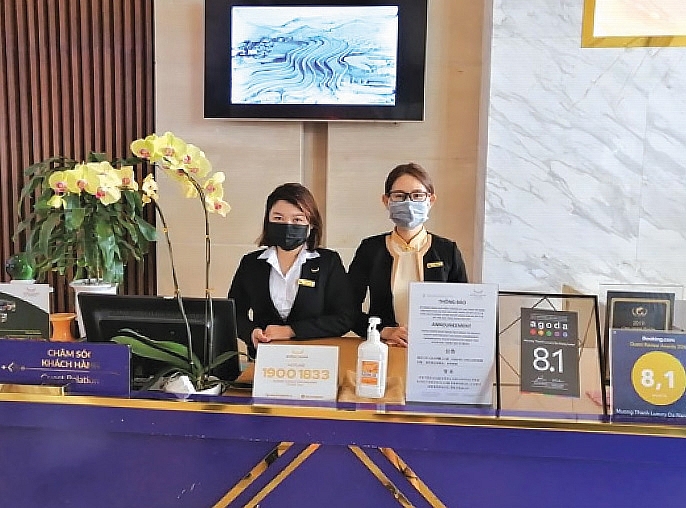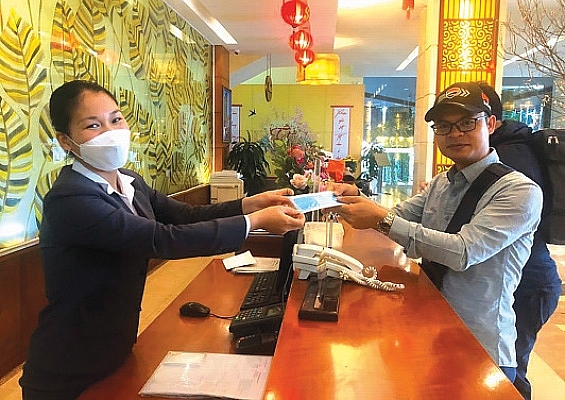Vietnamese hospitality proactive in combating health crisis
 |
| Vietnamese hospitality proactive in combating health crisis |
These days, large hotels in Ho Chi Minh’s District 1 are sparsely visited, in contrast to the bustling atmosphere in the same period last year. While the world is busy coping with the economic consequences that COVID-19 has already brought about, the hospitality industry is among those that suffer the most, almost crumbling under falling occupancy rates and cancellations.
To date, Ho Chi Minh City is home to more than 4,500 accommodation establishments, with some 90 per cent of them below the 2-star standard. Preliminary estimates show that total revenue of hospitality in the city has fallen by 70 per cent on-year, including sales of rooms, in-house restaurants, and other services.
Mauro Gasparotti, director of Savills Hotels APAC assumed that the first and most obvious impact would be the decline of Chinese tourists who account for 30 per cent of international arrivals to Vietnam annually. Coastal hotspots, such as Nha Trang in Khanh Hoa province, would be hit hard as Chinese visitors contribute an approximate 70 per cent to foreign tourists there, according to the Khanh Hoa Provincial Department of Tourism. Other major cities such as Hanoi and Ho Chi Minh City are also forecasted to be negatively affected by the slash of delays and cancellations of meetings, conferences, and overseas trips.
It is a gloomy prospect that has been unfolding for the hospitality industry. However, hoteliers have actively taken precautions to protect their guests and staff.
A representative from the Saigontourist Group told Timeout that since the end of January, the firm has implemented solutions to protect customers and employees at its member facilities. Specifically, each establishment is equipped with necessary medical devices and supplies. In addition, there are also instruction boards on epidemic prevention to keep staff and guests informed.
To cope with the epidemic’s challenges, Saigontourist Group has launched its first promotion campaign, offering flexible pricing and promotion policies on its whole system-wide scale. Besides this, the group also participates at the ITB Berlin travel trade fair in Germany, the Ho Chi Minh City Days festival in Aichi in Japan, and the ITB Bombay travel show in India, among other international events.
Le Thi Hoang Yen, general director at Muong Thanh Hospitality, the largest private hotel chain in Indochina, said that her hotels have conducted sterilisations to prevent the spread of COVID-19. Moreover, guidelines about the outbreak have been published and are handed out to the hotel’s staff and visitors. Finally, similar to many other hotels, Muong Thanh also equipped all its public areas with antibacterial hand sanitisers for convenient use.
“For all Muong Thanh hotels, the prevention of diseases is crucial to protect the health and lives of our employees and customers. We hope to foster the image of Vietnam as a safe, friendly, and civilised travel destination in the minds of international visitors,” said Yen.
Many hoteliers said that their employees’ awareness of disease prevention and health protection have been significantly improved. Hotel staff are required to check their body temperature before work and wear face masks at all times.
“The information about the current state of the COVID-19 epidemic is updated regularly, and strict preventive measures help our staff understand that hygiene is not only for visitors but also for protecting themselves,” said a hotel manager.
 |
LESSONS DRAWN
As Vietnam’s hospitality is suffering from the current depressing event, it is necessary to look at valuable lessons learnt from hotels in Hong Kong during the SARS pandemic in 2003.
Although being only a short-term crisis, SARS significantly impacted Hong Kong’s hospitality industry. Shortly after the WHO issued a warning on unnecessary travels to Hong Kong, the hotel occupancy rate there was reduced sharply, with visitors to the trade hub decreasing by 57.9 per cent on-year, according to the Hong Kong Tourism Board.
In order to survive the crisis, Hong Kong’s hotels implemented a cost-effective and innovative strategy of creating new short-term business services.
Hotels called off large-scale repairs and renovation projects. Personnel were rotated through departments, while others were encouraged to have early leaves. Some of the simpler jobs that had been assigned to contractors were then transferred to hotel staff. By doing so, employees were cross-trained and prepared for the industry’s recovery.
In addition to closing floors and restaurants, a number of hotels have also stopped serving banquets at their restaurants to reduce costs. Due to low capacities, some hotels also reduced the number of operating elevators to save electricity and maintenance costs. Unnecessary advertising and special promotions, as well as travel and entertainment businesses, were also suspended.
The innovative strategies were quite effective during the SARS epidemic. Although many travellers have cancelled bookings, hoteliers have realised the importance of maintaining a good relationship with their customers by making polite calls or sending emails. They also informed customers about their efforts in the SARS crisis and any special promotions.
Some mid-range hotels provided house-cleaning services to their business customers at reasonable costs; others turned their guest rooms into temporary offices for business leases, which was well received by companies that were trying to arrange staff in different locations and on different shifts to avoid contamination.
Moreover, Hong Kong tried to harness domestic tourism through special promotional packages, in line with the government’s proposal to develop local tourism as a way of reviving the economy. Some hotels had been working with local travel agencies to provide accommodation or meals for local tours primarily targeting domestic tourists.
As the COVID-19 crisis seems to continue for a while, Hong Kong’s experience in fighting epidemics is also valuable for Vietnam. With the domestic tourism market reaching 90 million people in 2019, the country boasts huge potential to overcome the current lack of Chinese, Japanese, and South Korean visitors, who previously covered a large share of international arrivals and are now nearly non-existent.
According to the Vietnam National Administration of Tourism, if the country manages the disease well and keeps it under control, Vietnam’s hospitality industry could very well overcome the COVID-19 storm like Hong Kong’s hotels had done with the SARS pandemic.
What the stars mean:
★ Poor ★ ★ Promising ★★★ Good ★★★★ Very good ★★★★★ Exceptional
Themes: Safe and Sound Vietnam
Related Contents
Latest News
More News
- Sheraton Phu Quoc rolls out Lunar New Year 2026 cultural and dining programme (February 11, 2026 | 09:00)
- Fairmont opens first Vietnam property in Hanoi (February 04, 2026 | 16:09)
- Marriott signs major deal to expand luxury hotel footprint in Vietnam (February 04, 2026 | 15:58)
- Welcome Year of the Horse at Four Seasons Resort The Nam Hai (January 30, 2026 | 16:18)
- The Grand Ho Tram to host the first-ever IBF convention in Southeast Asia (January 29, 2026 | 12:18)
- Danang Marriott ushers in Lunar New Year by the sea (January 28, 2026 | 11:42)
- Angsana and Dhawa Ho Tram offer a serene Lunar New Year retreat (January 23, 2026 | 23:38)
- Tides of Heritage: A Tet speciality at InterContinental Phu Quoc Long Beach (January 20, 2026 | 12:08)
- Muong Thanh launches Lunar New Year gifts inspired by tradition (January 16, 2026 | 16:41)
- The Grand Ho Tram seeks responsible entertainment with pilot casino access (January 16, 2026 | 10:56)

 Tag:
Tag:



















 Mobile Version
Mobile Version